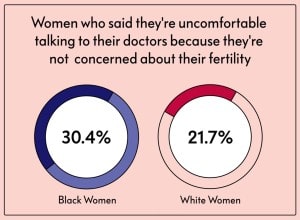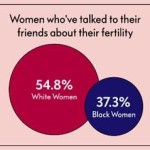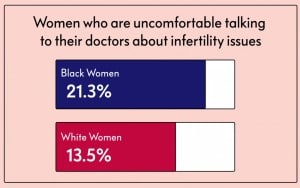In a recent Good Morning America interview, Former First Lady, Michelle Obama, spoke candidly about her new book, “Becoming.” What fills the pages are candid confessions and stories of personal struggles she’s encountered in life, including her arduous journey to motherhood.
Michelle Obama opened up to GMA anchor Robin Roberts about feeling “lost and alone” after suffering a miscarriage about 20 years ago.
“I felt like I failed because I didn’t know how common miscarriages were because we don’t talk about them,” Obama said. “We sit in our own pain, thinking that somehow we’re broken.”
She added, “That’s one of the reasons why I think it’s important to talk to young mothers about the fact that miscarriages happen.”
A single miscarriage is very common, occurring in nearly 25 percent of all pregnancies. Recurrent miscarriage—defined as two or more consecutive miscarriages— is seen less frequently. According to the American Society for Reproductive Medicine (ASRM), less than 5 percent of women will experience two consecutive miscarriages, and only 1 percent will experience three or more. If a woman has had two or more miscarriages, consulting with a fertility specialist and determining the underlying cause becomes necessary.
While miscarriage happens within the woman’s body, the emotional pain happens to both partners. It is important to know you are not alone when it comes to miscarriage or recurrent pregnancy loss. SGF patients—men and women alike—find support via online communities like our Facebook page, patient stories, and free local support groups.
Obama went on to reveal she underwent in vitro fertilization (IVF) treatment to have her daughters, Malia and Sasha, and how at ages 34 and 35, it hit her that “the biological clock is real” and “egg production is limited.”
“I think it’s the worst thing that we do to each other as women, not share the truth about our bodies and how they work,” Obama told Roberts.
After Years of Infertility, Gabrielle Union Welcomes First Child
Another woman in the public eye who has candidly spoken about her infertility struggles is Gabrielle Union, who just welcomed her first child with Dwayne Wade via gestational carrier.
[Related: More information on Gestational Carriers]
The actress, 46, and the NBA star, 36, shared their exciting baby news on Instagram, posting a series of photos with their daughter. “We are sleepless and delirious but so excited to share that our miracle baby arrived last night via surrogate and 11/7 will forever be etched in our hearts as the most lovely of all the lovely days,” Union captioned the sweet post. “Welcome to the party sweet girl! #onelastdance #skintoskin.”
Previously, Union appeared on an episode of The Dr. Oz Show to discuss her difficult infertility journey.
“Initially I didn’t know what the issue was, I got off birth control, I got married, and I was ready to start a family…and I didn’t think there was gonna be any problem, and there was,” Union explained. “So I was always having these early miscarriages, some from IVF and some just naturally happening on our own.”
When asked how many miscarriages she had, Union replied, “I lost track, it’s somewhere eight or nine, give or take.”
Over the summer, Union opened up about her adenomyosis diagnosis, “Towards the end of my fertility journey I finally got some answers, because everyone said, ‘You’re a career woman, you’ve prioritized your career, you waited too long and now you’re just too old to have a kid — and that’s on you for wanting a career. The reality is I actually have adenomyosis. The gag is I had it in my early 20s, and instead of someone diagnosing me they were like ‘Oh you have periods that last 9 or 10 days and you’re bleeding through overnight pads? Not a mere inconvenience perhaps there’s something more there.'”
She later told Hoda Kotb on Today, “Fertility is an issue, period, and having a career is not the price you pay for any ill. I think TV shows and films kind of make [out that] the frigid, single-focused career woman, that her career is the root of all problems in her life…and that’s just not the case.”
African-American Women Experience Lower Pregnancy Rates Associated with IVF as Compared with Caucasian Women
Shedding some much needed light on stories like Michelle Obama’s and Gabriel Union’s, Shady Grove Fertility’s very active research department set out to investigate. What were the reasons behind the different reproductive outcomes of African-American women undergoing IVF and Caucasian women undergoing the same treatment protocol? The findings from two of the SGF studies that sought to better understand the known health disparities affecting reproductive outcomes of African-American women compared with Caucasian women were presented during the American Society for Reproductive Medicine’s (ASRM’s) 2018 Scientific Congress in Denver, CO last month.
- Study 1: Aimed to Identify Reasons Why African Americans Experience Reduced Pregnancy, Higher Pregnancy Loss, and Lower Live Births from IVF Despite Producing More Eggs and Transferring Higher Quality Embryos as Compared with Caucasian Women.
- Study 2: Aimed to Identify the Reasons Why African Americans Experience Lower Gestational Age and Increased Risk of Preterm Birth Associated with Singleton Pregnancies from IVF Compared with Caucasian Women.
What is the biggest takeaway from both studies?
Given uterine conditions are more prevalent among African-American women, SGF physicians recommend that when infertility or recurrent pregnancy loss occur, patients should consult with a fertility specialist right away. One in eight couples experience infertility, and SGF reminds early intervention offers the best chances of success.
SGF Atlanta’s own Desireé McCarthy-Keith, M.D. recently teamed up with Oprah Magazine and Women’s Health Magazine to discuss how infertility impacts African-American women and the perception of infertility among the African-American community.

The divide is clear on how women of different races not only talk about infertility but on IF they seek treatment. 15 percent of White women seek medical help to get pregnant, compared with just 8 percent of Black women.

“Many Black women are seeking to end the silence around infertility in their communities, creating groups for women of color having access to resources, inspiration, and encouragement,” says McCarthy-Keith, who further states that this type of sisterhood is “invaluable.”
“It’s about having a support system in place because if you feel like ‘Everyone around me is having babies except for me,’ seeking those successes is very helpful for visibility,” adds McCarthy-Keith.
How to Talk to Your Doctor about Fertility

“There are specific factors that affect African-American or Black women disproportionately,” says McCarthy-Keith. Uterine fibroids and obesity, for example, are conditions that can negatively impact fertility—and Black women are affected by higher rates of both.
“If you’ve had unprotected intercourse for at least 12 straight months, and you’re under 35 years old, it’s time to see a fertility doctor,” says McCarthy-Keith. “If you’re 35 or older, after six months unprotected, see a fertility doctor.”
To learn more or to schedule an appointment, please contact the SGF New Patient Center at 1-877-971-7755 or complete this brief online form.






